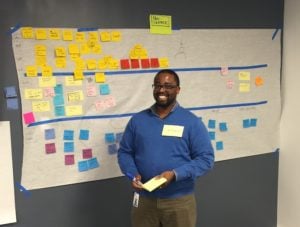We design our workshops to get your team on the same page with a common vocabulary and a ready-to-use set of tools. We provide foundational knowledge to create a clear understanding of roles and responsibilities, and a set of tools and methods for delivering products to market successfully.
- Designed for your team. Generic training is good for getting everyone up to speed quickly but it’s often hard to apply these concepts to your products and teams. We customize a curriculum that is tailored to your top issues.
- Proven frameworks. We leverage effective strategic frameworks with our own practical tools including the Applied Frameworks Planning Canvas.
- Embracing today’s methods. The latest planning techniques and frameworks, such as Agile and Lean methods, are tightly integrated into our workshops.
- Application workshops. It’s one thing to hear about a technique; it’s quite another to apply that technique to your product and business. We combine short presentations with workshops to ensure that your team has the skills to use these tools on a daily basis.
- Industry leadership. Your instructors have decades of product management experience and we’ve been at the forefront of the Agile movement. People rely on Applied Frameworks for thought-leading content and concepts.
- Delivered on your schedule. Some teams want a multi-day comprehensive course of study while others prefer to on-line education. We can do either.
Theory of instruction

Our courses are guided by a “learning by doing” model of education based on the Applied Frameworks “Know-Do-Have” model of course design:
- What participants will know after taking the class.
- What participants will do during the class to reinforce key concepts.
- What participants will have after the course to promote further practice and study.
Our goal is for learners to immediately apply what they have learned as soon as they return to work.
Learner-Focus
The majority of our courses leverage the latest techniques based on adult learning theory including concepts based on Sharon Bowman’s Training from the Back of the Room. This instructional design process is “learner-focused,” rather than “trainer-focused.” In other words, it focuses attention – and is based – on how learners learn rather than on how trainers train. It involves learners throughout the entire training, not just at the beginning or end.




